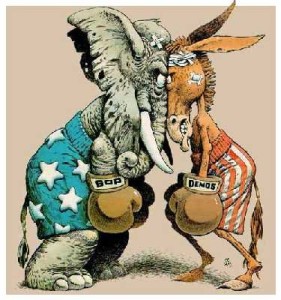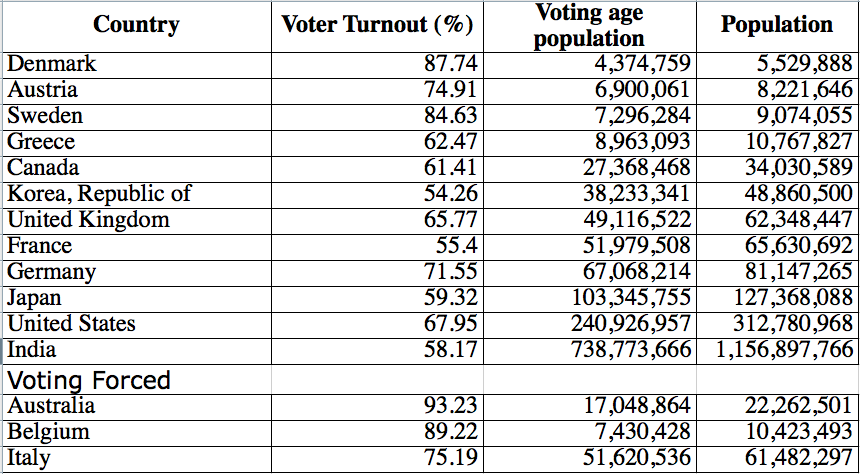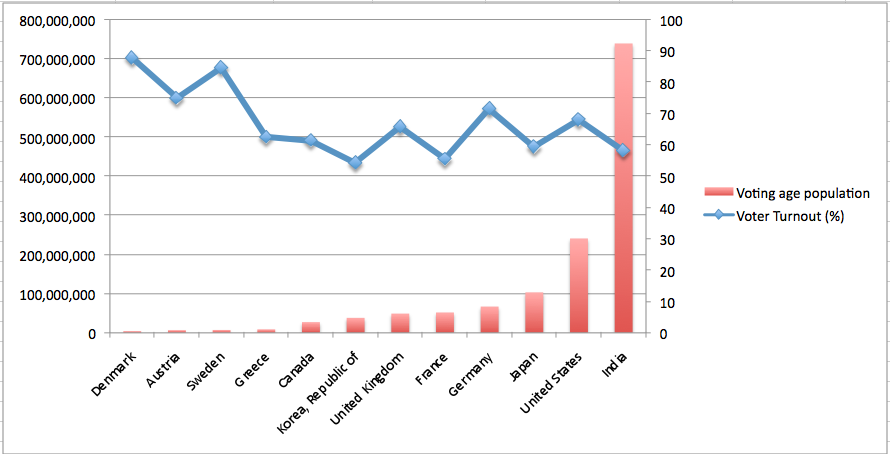Podcast: Play in new window | Download
Subscribe: Apple Podcasts | Android | RSS
In the third NFC podcast, we talk about voting in the modern-day democracy, the Quebec referendum, and whether we’d ever run for mayor!
Podcast: Play in new window | Download
Subscribe: Apple Podcasts | Android | RSS
In the third NFC podcast, we talk about voting in the modern-day democracy, the Quebec referendum, and whether we’d ever run for mayor!
Rachit,
Props for putting some work into the quantitative side of things! Not to nitpick too much, but the USA number looks fairly high (according to Wikipedia the 2012 Presidential election had a 57.5% turnout and hasn’t been above 60% since the 60’s). The trend is interesting though, and I think it makes intuitive sense that smaller populations will have larger voter turn out. Putting on my fanciest math hat, I think it’s worthwhile to check what happens when we extrapolate to either extreme (in this case, a small or infinite group). If you’re living with a few room-mates, do you vote for what food to order or what movie to watch? I think barring extenuating circumstances, you certainly do. In the other extreme, if there is an infinite amount of people, does it even make sense to vote at all? (Countably infinite sets? Cardinality?).
So yes, I agree with you, one of the challenges with large democratic systems is dividing a state in order to give votes more of a gravitas. One of the major problems with this type of approach is the actual divisions themselves. ‘Gerrymadering’, as the practice is called, has been a hot topic in the U.S. recently. It’s really easy to try and cheat the system by subdividing parts in such a way as to give an advantage to one party. Something to keep in mind. As my 80 year old Russian Electromagnetism professor told me: ‘there is no free lunch.’
To answer your call for ideas: I have two major thoughts, one practical and easily implementable and one that may be difficult to pass into law. First, the easy one: make voting day (at least for national elections) a federal holiday. I’m not sure why this is not already a policy. Most people in their voting age have jobs during the day and giving them some extra freedom to participate just seems like a no-brainer. Us ‘youth’ can say that it’s easy to find time throughout the day (or maybe cast an early ballot) but the reality is many people are not that organized. If you have to pick up your kid from day-care at 5 and then cook a meal for them, having to rush to the voting booth by 8pm doesn’t sound too appealing.
Second: give city, state/provincial and federal tax credits for people who have voted in any of the three tiers of elections (Municipal, Provincial, or Federal). This is similar to the ‘fines’ you mentioned, but it provides positive reinforcement, not negative. This may be difficult to enact into law, from a political standpoint, though it doesn’t seem impossible. In fact, from a logical point of view it should be clearly possible since the politicians who propose such a law shouldn’t be voted out of their positions. How could they? The people who would vote them out are the ones who would be eligible for the tax-break.
Positive reinforcements and clear opportunity is what I think society should provide to the voting public. If that still doesn’t work, well then, maybe we need to think deeper about the world we live in. As the saying goes: you can lead a horse to water, but you can’t make it drink.
Looking forward to our podcast next week 🙂
~V
In an ideal world, a vote casted by an eligible voter should represent an individual opinion on society’s values. And that vote, should mean something in and of itself. But you’re right, when things are stable, it seems that we tend to forget about the power of that vote and either get muzzled into the sports-like rivalries the political system creates or become a complacent bystander.

So in the spirit of the hazy future of Western democracy that you’ve painted, I thought it would be a useful exercise to explore this problem of voting or lack there of, with some potential, not always sane, solutions. The first and most often cited problem that people allude to is the feeling that their vote doesn’t matter in the sea of a giant populus. Naturally, I thought I’d conduct a quick little test and compare voter turnout to population size. Grabbing some data from the International Institute for Democracy and Electoral Assistance website, and with some amateur excel magic, here’s what I got:


Now, I know this analysis is as loose as a lot of things that would degrade the class of this blog. But, there is some common sense logic to what we in the trend above: you’re in a smaller group, so mentally that vote feels like it carries a lot more sway, and thus, people vote more. Now I realize the idea of splitting up nations is not only practically impossible, and economically perilous, but generally a bad idea for a lot of other reasons not worth mentioning. (Although, we could potentially keep this in mind for when we colonize the galaxy). However, a more reasonable thought worth pondering on is the idea to allocate more power to local and municipal government. Could a stronger and much larger municipal government give enough power to an individual’s vote to increase the chances of them participating in the election?
Another idea used in the democratic nations of our world is to make voting a legally mandated act, as it is in Australia, Belgium and Italy. The consequences for not voting in these countries aren’t anything catastrophic; a small fine must be paid if you do not vote. But this begs the question, do we need to channel our inner mother and force our children to eat their broccoli or we take away their allowance? And more importantly, do the votes casted by these unwilling participants dilute the vote of those passionate and caring about their stance?
What other out-of-the-box strategies do you think we could implement to:
1) Increase voter turnout numbers
2) Make a vote feel more important to an individual
Rachit, your post was short and to the point (kind of like you). I agree that votes are certainly more emphatic, carrying more ‘oomph’ when there is a bigger perceived change they could bring about (re: the difference between stability and war vs. subways and above ground light rail).
So is this a natural instability in the system? Does a stable democracy eventually lead to completely indifferent voters , easily swayed by straightforward rallying cries (Germany was treated unfairly after WWI, we deserve our living space back!)? Is it inevitable that society oscillates between democracy and martial law or totalitarianism?
Clearly the answer is complicated. It seems that the west, at least, has been relatively stable since the fall of the Soviet Union. Although again, perhaps the relative stability and the absence of a nation like the USSR – which could provide a clear contrast to the democratic process (serving as impetus for a typical citizen to carry out his ability to vote) is partly to blame for the various deadlocks and incompetencies in many political systems in the west. Without a clear opposition, a clear ‘opposing side’, countries like the U.K and the U.S. have instead focused on internal conflicts with one political party labelling the opposing party as the ‘other side’ to spur the same type of passionate voter turn outs as before.
Perhaps my mom’s confusion between ‘cheering’ and ‘voting’ is deeper than it seems. There are certainly many overlaps between political and sport affiliations. Many people are born into them, and in many countries, switching political sides is just as bad as switching between cheering for the Leafs and the Habs. What’s a great way to improve fan turn out at games? Rivalries. Delicious, delicious rivalries. So if we don’t have an international rival, we better have internal rivals to engage the public. The only problem with this parallel is that good political systems are built not on rivalries, but on compromise and the ability to find a happy middle ground.
If our society craves conflict and needs clear contrasts to engage with a process, what does this mean for the future of western democracy?
~ V
P.S. This post was written in Berkeley, California on a grassy hill off of Oxford street.
Much like the World Cup, I have no votes to dish out to any particular party. I enjoy my passive involvement in the system for it’s own merits. Go soccer go!
Like boobies, all democracies aren’t created equal. Democracy in this country means something different than democracy in a nation fighting to get it. Living in the first world, with a high standard of living, our basic rights of life are for the most parts satisfied. With our social support structure, public transit and school systems, even living off a minimum wage job can get you by. That minimum wage job, although difficult, can support life, with a small vacay here and there too. Work harder, you can learn some more skills in school and get a better job. All of these basic tenants are created through the values of our society because it’s represented by a democracy. While everyone isn’t particularly satisfied, as demonstrated by Arrow’s Impossibility Theorem, there is a big enough subset of people, me included, that are happy with the status quo, irrelevant of the particular leadership. These parties we vote for don’t differ to the point that casting a vote for one will mean jeopardizing these rights.
So it’s not a matter of me or many others who didn’t vote, ‘losing faith’ in our political system, it’s us living comfortably in the environment it’s created. In a different political climate, where the citizens feel like the lower pillars of Maslow’s hierarchy of needs are being poached at, a vote would hold a lot more oooompf.
A new week, a new topic, Rachit. We talked about sports, so to segue, I’ll quote my immigrant mother when she sees me watching the world cup: ‘Which team are you voting for?’ she’ll ask.
‘Rooting for, mom,’ I’ll correct her. ‘I’m voting for the green party and their soccer team is not very good.’
So, voting. Democracy: the great social pinnacle of our time, and another great dichotomous theme. On one hand, millions of people around the world are willing to risk their lives for the chance to mark a box on a piece of paper, while on the other, the process has become stale in many western countries, with record low voter turn outs. People talk of many democratic decisions negatively: ‘designed by committee’, ‘too many chefs in the kitchen,’ yet political processes are often criticized not for the process itself, but for the ‘corrupt politicians’ who participate in them.
The optimal social structure has of course been a topic of debate since antiquity (if you haven’t read Plato’s utopia in his ‘Republic,’ it’s an interesting take on the ideal society). I think we would be wise to stray away from talking about the merits of specific political systems so we don’t look like straight up ignoramuses. Sufficed to say that most of the modern systems have tried their best to heed the advice of Peter Parker’s uncle: ‘with great power, comes great responsibility.’ But, of course, with diluted power comes anonymity, corruption and slow, lacklustre progress.
One particularly interesting mathematical result you may have not heard about is the Arrow’s impossibility theorem. Briefly, the theorem states that it is in fact impossible for any rank-order deterministic voting system to satisfy several reasonable expectations (‘fairness criteria’) within a political system that has three or more possible voting options. So even in principle, people will always have a reason to complain in any democratic process (that is deterministically determined – there are interesting probabilistic approaches, similar in spirit to the ‘anti-tanking’ rules in the NBA/NHL for draft lotteries, that can get around this limitation).
So with that, I want to ask you a question that’s been on my mind a lot lately. If one is losing faith in the political system (perhaps also lacking the time to understand the issues and the unadulterated positions of each political option), is it better to abstain from voting or to choose the best of the available options? Should one follow George Carlin (see his famous ‘Why I don’t vote’ standup) and stay home on election day or should we suck it up and choose one side?
For the sake of this post, it would be great if I had a clear-cut position on this that we could debate. But I have to be honest with you: I don’t. I’ve re-written this paragraph several times, thinking of counter points just as I finish my last sentence (dammit, Mary Shelley, I hate opinions too!). It’s definitely a compelling argument to say that one has to vote because we must deal with the system and the options that are handed to us (much like other parts of life). Conversely, however, the need to ‘choose sides,’ can and often does to lead to extremist candidates (tea party?) that cause unnecessary gridlock in political systems serving diverse populations. It’s easy to recommend voting only after you’ve read and understood the issues, but if the person needs convincing that it is worthwhile to vote in the first place, how likely will they be to fully comprehend nuanced, 21st century political debate?
Looking forward to hearing your thoughts.
~V
© 2026 Never From Concentrate
Theme by Anders Noren — Up ↑